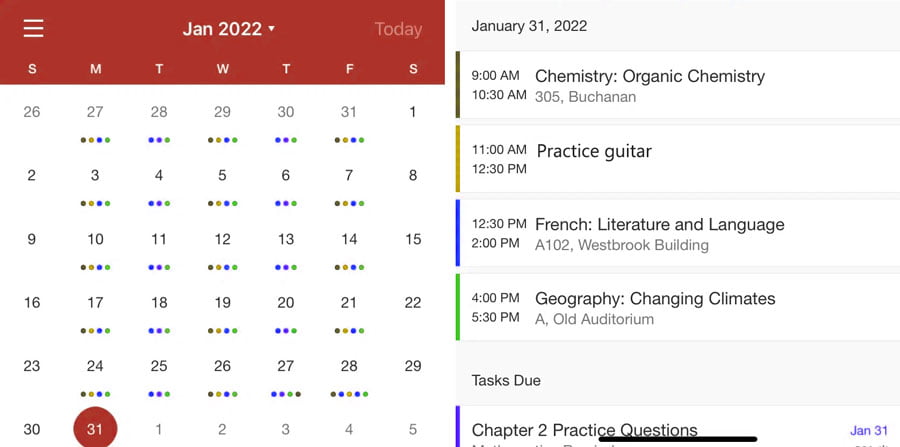Juggling classes, homework, social life and sleep is already a challenge, right? Now try fitting in daily guitar practice on top of all that. It can feel impossible...
But don't worry, I've been there myself. As a guitar teacher who went through the college grind, I've learned some key strategies that will help you find time to keep progressing on guitar, even with a crazy busy schedule.
Want to know the secrets?
Keep reading for my top 5 tips that got me (and other students of mine) through college with my guitar skills intact and growing. Number 2 might surprise you.
1. Schedule Guitar Time Like a Class
- Block off 30-60 minutes per day in your calendar for guitar practice
- Treat it like any other class - don't skip or reschedule it
- Consistency is key to improving your skills

Making time for guitar practice is all about prioritizing it in your schedule. One effective strategy is to actually schedule in practice time like you would for a class.
Look at your calendar and find a 30-60 minute block of time you can dedicate to practicing guitar each day. It could be first thing in the morning, between classes, or later in the evening. Put it in your calendar and treat it like any other important class or appointment. Apps like this one help in organizing your schedule.
The key is consistency. Practicing a little bit each day, even just 20-30 minutes, is far more beneficial than trying to cram in longer sessions irregularly. Daily practice, even in short chunks, helps build muscle memory and makes guitar playing more intuitive over time.
If you schedule guitar practice and stick to it like you would any other class, you'll find those small sessions really add up. You'll make steady progress and guitar practice will become a natural part of your daily college routine.
2. Delegate Essays to Writing Services
- Frees up significant time for practicing guitar
- Only use with to help meet tight deadlines, don't get hooked on this
- Downsides: potential quality issues and ethical concerns
When the demands of college feel overwhelming, using an essay writer service can open up precious hours that you could use for guitar practice. For a reasonable fee, writers can help you complete assignments on time, even on challenging topics.
However, it's important to choose a reputable service that provides high-quality work from native speakers.
In my experience, these services work best as an occasional backup, not a regular solution. I used essay writers a couple times in college when I was completely swamped, and had absolutely no chance of turning in an assignment on time. But I always made sure to still research the topics myself and provide detailed outlines. The essays were solid, but I always did a final edit to put them in my own voice before submitting.
Please don't use this to skimp out on writing challenging topics though. That's why you're in college (or university), to think and learn. Only use this when you're super pressed for time.
3. Squeeze in Short Practice Sessions
- Take advantage of 5-10 minute breaks between classes
- Focus on one skill or trouble spot per micro-session
- Regular short practices add up and keep skills sharp

Even though you may not always have a full hour to dedicate to practicing guitar, it doesn't mean you can't make progress. The key here is to take advantage of the small pockets of free time in your schedule.
Got a 10 minute break between Zoom classes? Pick up your guitar and work on a tricky chord transition or scale run that's been giving you trouble.
Waiting for your laundry to finish? Use that time to drill a new picking pattern.
These short, focused bursts of practice can really add up over the course of a day or week. The main strategy in using these few minutes effectively is to zero in on one specific skill per micro-session. This way you can ensure you're making the most of every minute.
I used to always keep a guitar on a stand in my dorm room (I'm sure you do too) and would grab it for a quick 5-10 minute session whenever I had a chance. No time for warmups and such "formalities", but it was still amazing how much progress I made from these little moments of practice sprinkled throughout my day.
The beauty of this approach is that it prevents your skills from getting rusty if you can't schedule longer practice sessions for a few days. Even if you can only manage 10 minutes here and there, that consistent engagement with your instrument will keep your muscle memory sharp.
So next time you find yourself with a few minutes to spare, resist the urge to scroll TikTok and reach for your guitar instead of your iPhone.
4. Make it Social
- Start a guitar club or find jam partners
- Commit to regular meetups to practice together
- Motivate and learn from each other
One of the best ways to stay motivated and make time for guitar practice in uni or college is to make it a social activity, and it's arguably much more fun that practicing alone in your dorm room.
You could start an informal guitar club, or just find a couple of jam partners to meet up with regularly. Commit to getting together at least once a week to practice, learn songs, improvise together, or even write originals.
When I was in college, I started a jam group with a few other players I met on campus. We would meet up every Thursday night in one of the common rooms to trade licks and work on songs together. Having other people to be accountable to makes it much easier to show up consistently, and playing with others is a great way to push yourself, learn new techniques, and stay inspired.
Not to mention that this is a great way to connect with new people and make friends.
5. Optimize Your Practice Routine
- Use a metronome to maintain timing
- Focus on your weaknesses, not just what you already know
- Study music theory to understand what you're playing
- Balance practicing with playing songs you enjoy
To make the most of your limited practice time, you need to optimize how you practice. It's not just about putting in the time, but using that time wisely.
First, always use a metronome when practicing to internalize good timing and rhythm. This develops your internal clock and makes your playing sound tight and professional.
Next, zero in on your specific weaknesses rather than always playing what you already know. It's more productive to spend 10 minutes working on a challenging new skill than 30 minutes noodling on familiar riffs.
Studying some music theory also helps you understand the "why" behind the "what" you're playing. Even basic knowledge of scales, chords and rhythms accelerates your learning. For example, I made a rule that for every new scale or technique I worked on, I had to apply it to a real song I liked. So after I drilled minor pentatonic scales, I'd jam to a classic rock track and improvise using those scales. It made practice more engaging and helped me see the real-world applications.
Finally, be sure to balance focused practice with playing songs you actually enjoy. Practicing shouldn't feel like a chore. Keep things fun by learning your favorite tunes and jamming along to backing tracks.
You can get some ideas from these:
And remember, you have access to loads of jamtracks on TheGuitarLesson.com here, and this site.
I hope these tips help you make the most of your limited practice, I know how busy college and university can get. Give 'em a try and let me know how it goes.
Got any other strategies that have worked well for you? I'm always looking to learn from other players. Drop a comment below and share it please!



Wow, the part about making it social totally clicked with me. Jamming with friends keeps it fun and motivating. Plus, you learn so much from each other.
Optimizing your practice routine is clutch. I started doing focused warm-ups and it made a noticeable difference. Great tip Tom.
I’ve been scheduling my practice time for months now, and it seriously works wonders. I even created a shared calendar with my friends, so we’re all on the same page. Highly recommend this tip.
I’m curious about the short practice sessions section. How short can they be and still be effective?
The key there is to concentrate on just 1 technique that you are still learning. So don’t just doodle something you already know. If you only have 5-10 minutes, work on something you don’t know well yet, like a scale, a rhythm, etc.